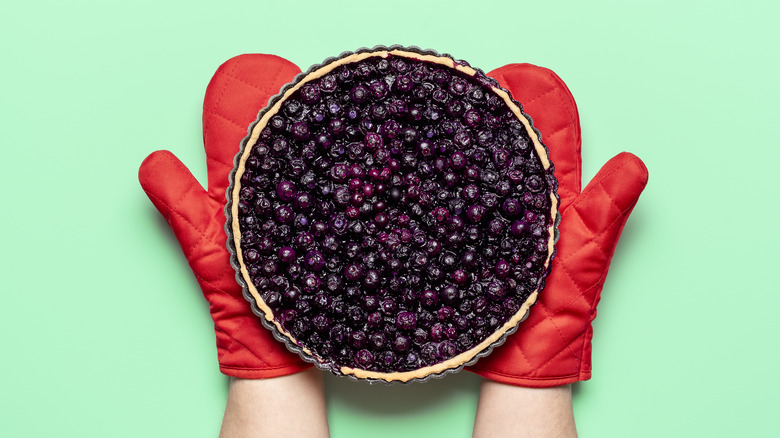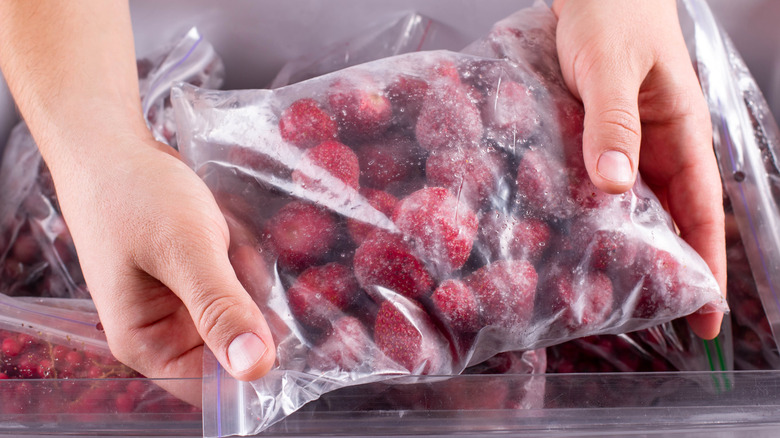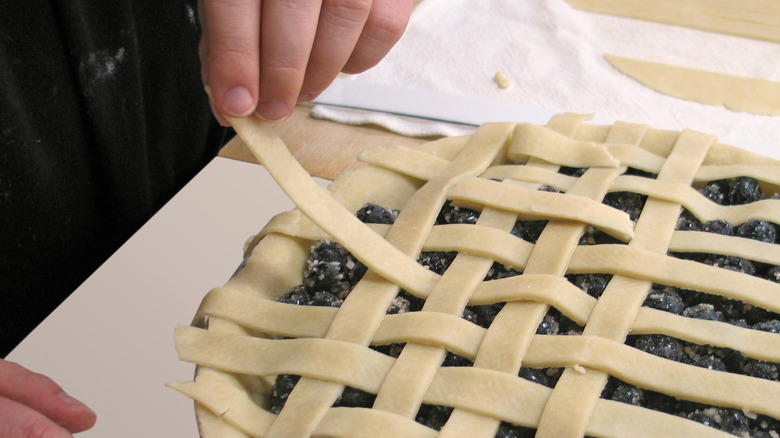You Should Only Use One Kind Of Frozen Fruit For Homemade Pies
Made-from-scratch fruit pies are delicious, heartwarming labors of love. To get the authentic experience, it's often been advised to make your own all-purpose pie crust and use only fresh fruit, but sometimes we just don't have the desire to peel all those apples, or it may be that the cherries you want to use aren't in season. But, will our pie recipes really suffer if we opt to use frozen fruit to skip a few steps and save some time?
The answer depends on which frozen fruit you plan to use.
Whether they're sliced or frozen whole, most fruits that spend time in the freezer don't come out the same as their fresh counterparts. The flavor and aroma are slightly dampened, and the consistency takes a downward turn. This isn't a problem if you're making smoothies or ice cream, where fruit isn't the main character and is blended anyway. But, when it comes to pies, texture and taste matter because the fruit is the star of the show.
There is an exception to this rule, however: blueberries. The sweet morsels always make a mighty good pie, no matter if they're fresh or frozen.
What happens to fruit in the freezer?
To understand why not every frozen fruit will work for pies, it might help to know the science behind it. Fruits contain water, and when placed in the freezer, that water solidifies into ice. It would seem rational to think that, once the ice melts back into its liquid state, the fruit should maintain its structure once it all thaws. But, unfortunately, this isn't what happens.
That's because the water becomes nestled deep inside fruit cells, and when it freezes, the liquid expands and transforms into ice crystals. The solid ice starts to outgrow the cells, causing their walls to break, explains a University of Minnesota Extension article. When this happens, the fruit's cellular structure is forever compromised. So, when you grab a bag of frozen peaches from the freezer, those once solid, supple slices are now sad and soggy.
But this is not the case with blueberries because they have a smaller surface and a more dense skin so they don't excrete as much water.
There are some things you can do to ensure your pie will turn out perfect when working with this frozen fruit. The first tip is to freeze your own blueberries picked from the grocery store, rather than buying prepackaged bags. One of the best ways to freeze blueberries is to rinse them off and spread them out on a sheet pan and put the full pan in the freezer for a few hours. Once frozen, transfer the berries to a freezer-safe container with a good seal, and pop them back into the freezer until you want to use them.
Tips for baking a pie with frozen blueberries
When you're ready to bake that blueberry pie, you can search for recipes that explicitly make use of frozen fruits, or you can make a few tiny tweaks to your grandma's beloved blueberry pie recipe.
One good tip to start with is, when assembling your filling, don't thaw the berries. Toss them right in the bowl and add in some extra thickening agents like cornstarch, flour, or tapioca to make use of the excess liquid.
Also, try a lattice top (or go topless) instead of using a solid circle of dough. This lets more liquid evaporate during the baking process and prevents a soggy crust. And, since the frozen berries are extra cold, they'll lower the temperature of your pie filling. So, increasing the cooking time by 10 to 15 minutes will ensure a fully cooked product.
As blueberries are touted as the preferred frozen fruit to use for homemade pies, these tips will only increase your already considerable chances of success.



